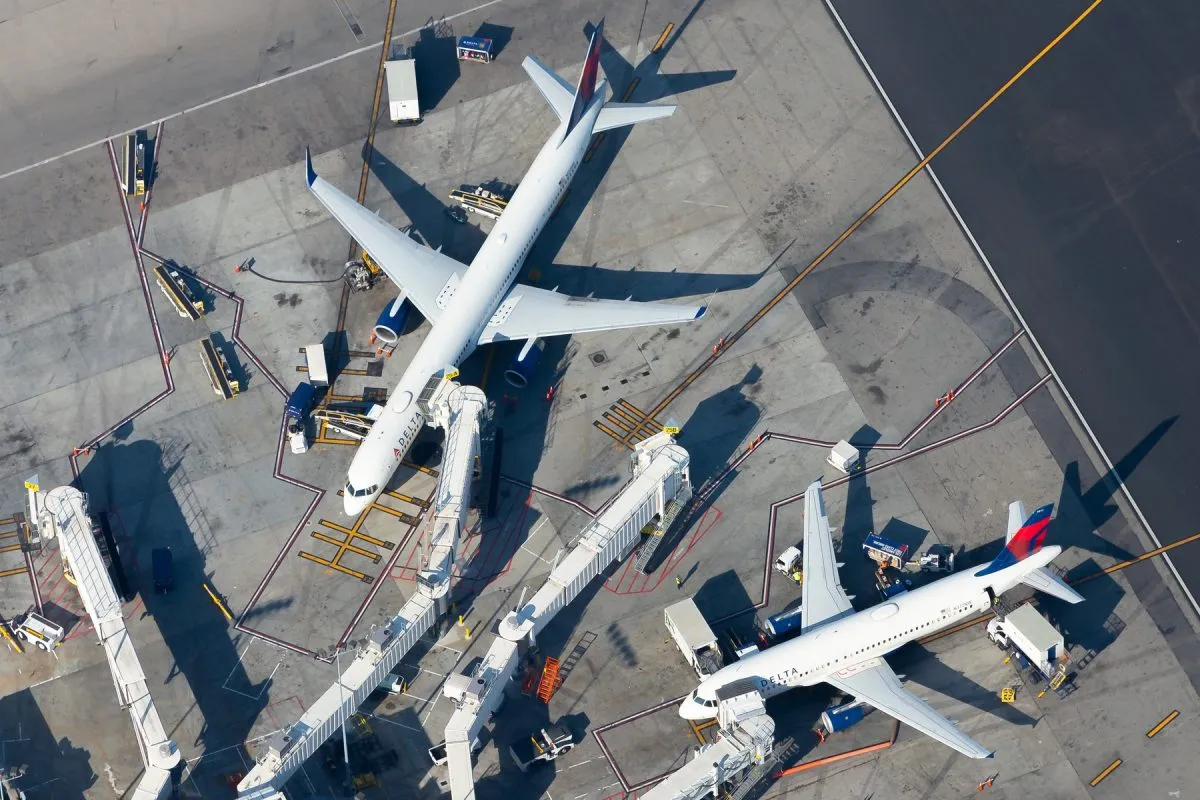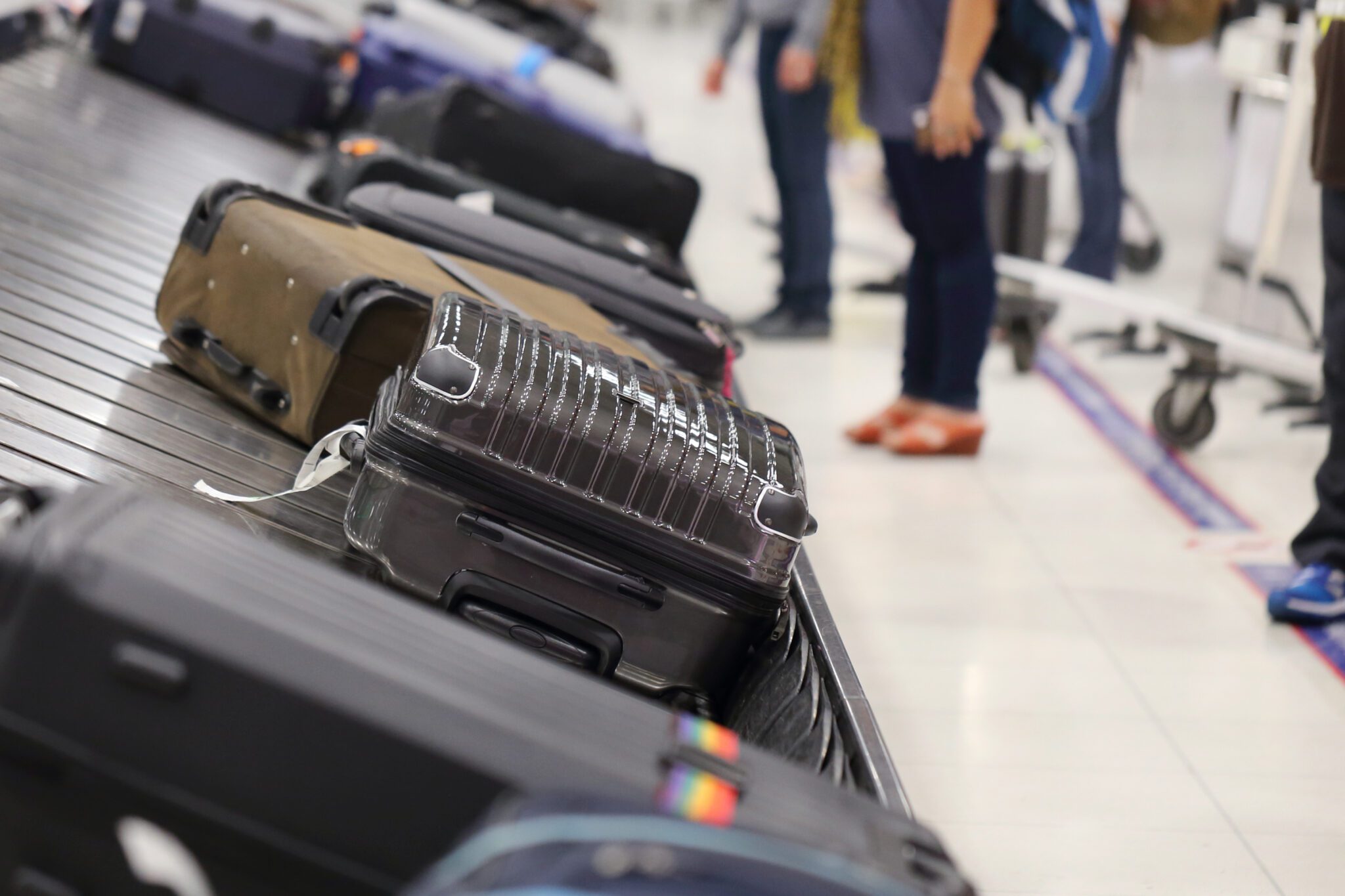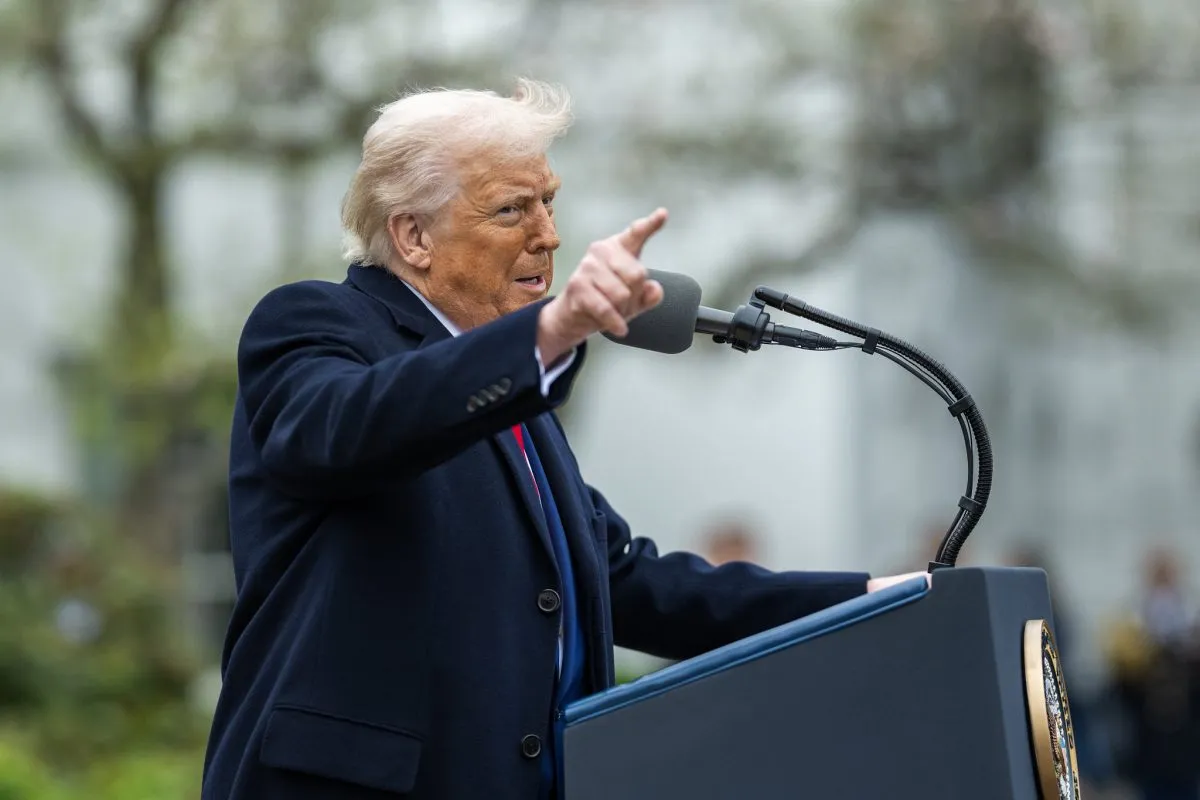U.S. Tariffs Cloud Airline Industry Outlook as Stocks Plummet

Skift Take
Airlines are in uncertain territory after President Donald Trump announced the latest round of tariffs.
The tariffs will extend to nearly all imports from a long list of countries: A baseline of 10% for trading partners; 25% on all imported cars and reciprocal tariffs on at least 50 countries are as high as 50%.
Major U.S. airline stocks plunged following the announcement. United Airlines shares were down 12%; Delta Air Lines shares fell 9%; and American Airlines was down 8%.
Delta and American had already lowered their first quarter outlooks, citing economic uncertainty as a reason.
“The outlook has been impacted by the recent reduction in consumer and corporate confidence caused by increased macro uncertainty, driving softness in Domestic demand,” Delta said in a regulatory filing. The Atlanta-based carrier is set to report first-quarter earnings April 9.
Airlines Say They Still See Growth
It’s unclear how long the tariffs will last, but Breeze Airways CEO David Neeleman said on CNBC on Thursday that the low-cost carrier was continuing to grow.
“When times get tough and people need to buy food and pay their rent, they just look a little harder for lower fares,” Neeleman said. “So, I think we’re in a really good spot. We have 87% of our routes, no non-stop competition.”
United CEO Scott Kirby said during an investor conference in March that the carrier had seen some softening demand in domestic markets, but international travel remained strong.
“Good news is that international, long haul, Hawaii, premium, all remain really strong,” Kirby said. “But we have seen government and some low-end consumer leisure weakness.”
United is set to report first-quarter earnings April 16.
However, Henry Harteveldt, the president of Atmosphere Research Group, warned that tariffs — combined with travel warnings from multiple European countries — could have a ripple effect on the airline industry.
“What I'm really worried about is if things get really bad, could we see the EU or individual European governments renounce open skies agreements that they may have with the U.S. or attempt or cancel the joint ventures that exist between various European airlines and US carriers.” Harteveldt said.
The U.S. Travel Association said it was seeing some “concerning trends.”
“The travel industry is seeing concerning trends in both domestic and international-inbound travel,” the trade group said in a statement. “We attribute this to a variety of factors, including a strong dollar, long visa wait times, concerns over travel restrictions, a question of America’s welcomeness, a slowing U.S. economy and recent safety concerns. These challenges are real and demand decisive action.”
Wall Street Expresses Concern of a Travel Slowdown
Before the announcement, analysts had already been expressing some concern that tariffs and overall economic uncertainty in the U.S. could depress travel demand.
Melius Research analyst Conor Cunningham said in a note to investors on Sunday that demand for leisure travel was originally expected to stay steady in 2025.
“With the return of Trump, there was optimism in pro-growth policies that would stimulate travel further,” Cunningham wrote. “But to date, expectations around the economy have been tempered.”
Deutsche Bank said in a note on March 28 that it was expecting lower summer airfares this year due to the slowdown in demand.
“Furthermore, we are now seeing a slowdown in air travel from Canada to major destinations such as California, Florida, and Las Vegas as Canadians are preferring to vacation elsewhere in response to the punitive tariffs that are being proposed by the US,” the Deutsche Bank note read.
Europe Assesses the Fallout
The global nature of the airline industry means companies near and far will be impacted by Wednesday’s announcement.
In Europe, governments and businesses are assessing the fallout, with the airline sector facing a double whammy of direct and indirect challenges. As well as tariffs making aircraft more expensive, a sustained economic slowdown would reduce passenger demand.
Share prices at Europe’s largest long-haul airlines plummeted on Thursday. Air France-KLM sank 5.7%, IAG — the parent company of British Airways, Iberia, and Aer Lingus — dropped 5.2%, while the Lufthansa Group ended the day down almost 4.8%.
Matt Dorset, analyst at London-based investment firm Quilter Cheviot, highlighted complex global supply chains as a cause for concern for European planemaker Airbus, noting that around 70% of an aircraft’s parts are typically outsourced.
However, he suggests it will ultimately be airlines that are hit with the bill for higher manufacturing costs: “Airbus may shoulder some of this cost, but largely it will be passed onto airlines.”
Prioritization of Non-U.S. Airlines?
In 2024, about 20% of Airbus commercial jet deliveries were to U.S. customers. Echoing earlier comments from Airbus CEO Guillaume Faury, Dorset said the company may choose to prioritize orders from outside the United States: “Airbus can mitigate this by partially supplying U.S. customers from its production facility in Mobile [Alabama] and by prioritising deliveries to non-U.S. customers.”
It remains unclear how strongly Europe will retaliate against the new U.S. tariffs and if sector-specific opt-outs can be secured.
If things do get nasty, Dorset suggests it could be U.S. planemaker Boeing that comes out worst: “In the event of retaliatory actions from Europe and other countries, we expect Boeing to suffer more than Airbus due to its higher share of non-U.S. deliveries compared to Airbus's share of U.S. deliveries.”
Asked by Skift for its response to the tariffs, an IATA spokesperson said the airline trade body had nothing to add beyond comments made by Willie Walsh earlier this week.
Speaking to Reuters on Tuesday – before the global tariffs were announced – the IATA director general said: “It's additional uncertainty which we never welcome but we've always been able to manage.”
Walsh said Trump’s approach to date was "net positive" for the airline sector and suggested it could encourage industry consolidation.
The IATA chief also highlighted an indirect impact of U.S. policy changes on Europe: “I think it is important that Europe re-evaluates its role in the world, and I think the Trump administration has caused that to happen much more quickly than I had expected.”
A Weakened Economic Outlook
The UK's Office for Budget Responsibility estimates a worst-case scenario involving a global trade war could reduce the country’s GDP by as much as 1%. If realized, this would likely dampen demand for air travel.
Professor John Bryson from the Birmingham Business School in the UK said the ramifications for the global economy could be significant: “No one wins in a tariff war. Tariff wars produce uncertainty, and uncertainty erodes economic growth.”
The tariff announcement comes at a time when transatlantic demand was already fragile. Speaking on Monday, Virgin Atlantic financial chief Oli Byers said trading in the January-March quarter of 2025 was “very strong,” however, he cautioned that the U.S. market may be cooling.
“In the last few weeks, we have started to see some signals that U.S. demand has been slowing," Byers is quoted by Reuters, adding: “We think that is quite a natural reaction to general consumer uncertainty.”
Without quantifying the scale of the slowdown, Byers said any decline in American bookings would come from a high base. Demand for travel between the U.S. and Europe has boomed in the post-pandemic years – particularly in premium cabins where Virgin has a strong offering.
While much of the current industry focus is on tariffs, the oil price is another top consideration for European airline executives. Speaking to Skift last week, Ryanair CEO Michael O'Leary said in spite of global economic instability, lower oil prices would be good for airlines: “If Trump is successful in reducing the cost of oil in the next year or two, then I think [he] would be net-positive to the business.
“The big upside – I think it is inevitably coming – BP, Shell, and others are starting to prioritize fossil fuels. If that results in increased supply and prices come down, ultimately the world economy gets a boost. It may also be the only way Europe can pay for its increased defense spending, but airlines will be the direct beneficiaries of cheaper fossil fuels.”
Airlines Sector Stock Index Performance Year-to-Date
What am I looking at? The performance of airline sector stocks within the ST200. The index includes companies publicly traded across global markets including network carriers, low-cost carriers, and other related companies.
The Skift Travel 200 (ST200) combines the financial performance of nearly 200 travel companies worth more than a trillion dollars into a single number. See more airlines sector financial performance.






